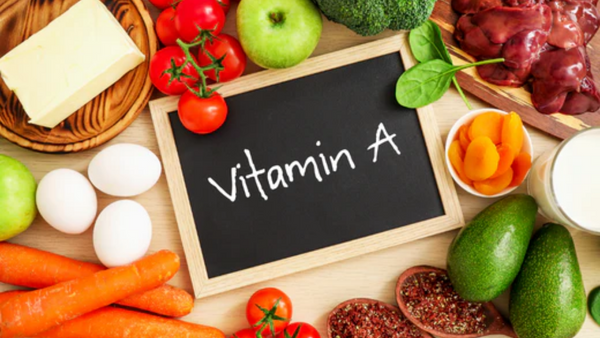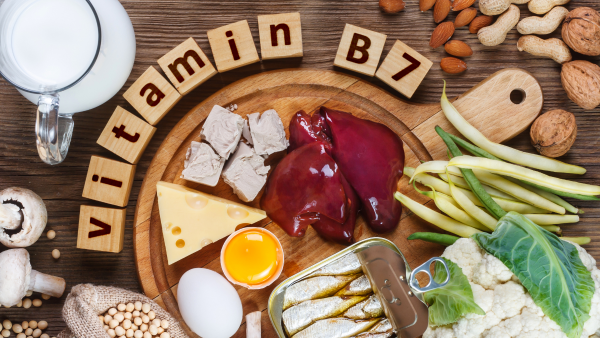Vitamin A is also known as the skin and eye vitamin. It is an essential nutrient that we must consume through our diet. If we do not get enough vitamin A, this can have health consequences.
Here you will learn why vitamin A is so important, how to recognize a deficiency and how to remedy it.
What is vitamin A?
Vitamin A is a fat-soluble vitamin that occurs in foods in the form of retinol and retinyl esters. Plant foods mainly contain precursors of vitamin A, so-called carotenoids. The best known representative is β-carotene, which is found in abundance in carrots, sweet potatoes and pumpkin.

Functions of vitamin A in the body
Vitamin A performs many different functions in the body.
The most important ones include:
- Strengthening the skin barrier : Vitamin A has important functions in the development and maintenance of the skin. It therefore counteracts the penetration of germs through the skin.
- Vision : Vitamin A is very important for the eyes; it is needed, for example, for light-dark vision.
- Immune system : Vitamin A is needed for the production of antibodies and promotes phagocytes that neutralize germs. [1]
The European Food Safety Authority ( EFSA ) confirms the following effects of vitamin A in its Health Claim Regulation:
Health Claims:
- Vitamin A contributes to normal iron metabolism.
- Vitamin A contributes to the maintenance of normal mucous membranes.
- Vitamin A contributes to the maintenance of normal skin.
- Vitamin A contributes to the maintenance of normal vision.
- Vitamin A contributes to the normal functioning of the immune system.
- Vitamin A has a function in cell specialization.
Symptoms of vitamin A deficiency
A vitamin A deficiency manifests itself through the following symptoms: [2]
- Night blindness
- Increased susceptibility to infection
- Dry and rough skin
- Cataract
- Dry eyes and yellowish, keratinized spots (Bitot spots)
- Growth disorders in children
- Increased risk of cancer
Causes of vitamin A deficiency
A vitamin A deficiency can have various causes. The most common causes include:
- Vegan diet : The active form of vitamin A is only found in animal foods. The vitamin A requirement can also be covered by provitamin A in plant foods, but the risk of vitamin A deficiency is significantly increased.
- Digestive disorders : Problems with fat digestion lead to a lack of vitamin A. The gall bladder and the pancreas, which produce important digestive enzymes, are particularly important for fat digestion. If there are problems here, the vitamin A from food cannot be absorbed properly.
- Pregnancy and breastfeeding : During pregnancy and breastfeeding, there is an increased need for vitamin A. Pregnant women need 800 µg of vitamin A daily, while breastfeeding women need 1,300 µg. [3] This makes it more difficult to meet the need for vitamin A through food.
- Alcohol abuse : Vitamin A is stored in the liver. If the liver is damaged by excessive alcohol consumption, its storage capacity is impaired and a deficiency can easily occur.
- Zinc deficiency : Zinc has important functions in vitamin A metabolism. If zinc is missing, vitamin A deficiency can easily occur.
Vitamin A in food
Vitamin A is found in many foods. However, plant-based foods only contain precursors of vitamin A. This means that the body has to convert it into vitamin A in order to use it.
1 µg retinol corresponds to 12 µg β-carotene (e.g. from carrots) and 24 µg of other provitamin A carotenoids.
In order to standardize the usable vitamin A content of foods, the retinol activity equivalent ( RAE ) was introduced.
Note : The vitamin A content is sometimes also given in international units (IU). 1000 µg vitamin A corresponds to approximately 3,333 IU.
The daily requirement of vitamin A is approximately 700 – 850 µg RAE, depending on age and gender. [4]
Here are the 10 best sources of vitamin A: [5]
|
Groceries |
µg RAE/100 g |
|
|
1. |
Cod liver oil |
30,000 |
|
2. |
Beef liver |
4968 |
|
3. |
eel |
1043 |
|
4. |
Carrots |
835 |
|
5. |
Sweet potatoes |
709 |
|
6. |
butter |
684 |
|
7. |
spinach |
469 |
|
8. |
pumpkin |
426 |
|
9. |
Cheddar |
263 |
|
10. |
Eggs |
160 |
Correct vitamin A deficiency
In the case of a vitamin A deficiency, high-dose vitamin A supplements are usually necessary. High-dose vitamin A must be prescribed by a doctor, as vitamin A is toxic in high doses. An overdose manifests itself in hair loss, loss of appetite, headaches, skin changes and dizziness. Too much vitamin A can also cause liver damage. During pregnancy, a vitamin A overdose can lead to malformations and growth disorders.
Therefore, without medical consultation, a maximum of 800 µg should be taken daily.
In cases of digestive disorders, vitamin A often has to be supplemented over the long term to ensure adequate vitamin A supply. However, the consumption of foods rich in vitamin A (especially liver ) can also help to meet an increased vitamin A requirement.
When it comes to vitamin A supplements, you should make sure that they are of high quality. They should be free of unnecessary additives such as binding and separating agents, colorings and sweeteners. Since vitamin A is fat-soluble, it makes sense to take vitamin A dissolved in oil.
Here you can find Vitamin A from Viktilabs.
[1] https://pubmed.ncbi.nlm.nih.gov/29493984/
[2] https://www.ncbi.nlm.nih.gov/books/NBK567744/
[3] https://www.dge.de/forschung/referenzwerte/vitamin-ab-caroten/
[4] https://www.dge.de/forschung/referenzwerte/vitamin-ab-caroten/


















